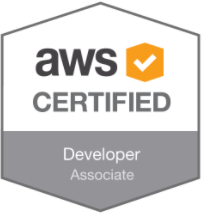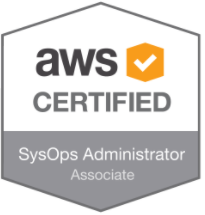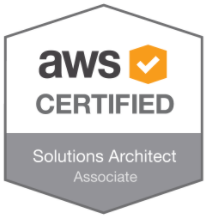April was a good month. Now I completed all three Amazon Web Services Cloud (AWS) associate certifications AWS Certified Solution Architect, AWS Certified Developer (2018), AWS Certified SysOPS Associate (2018).



Cloud Native, Big/Fast Data, Containers. AWS, Azure and GCP certified..
April was a good month. Now I completed all three Amazon Web Services Cloud (AWS) associate certifications AWS Certified Solution Architect, AWS Certified Developer (2018), AWS Certified SysOPS Associate (2018).



This posting is based on a quick customer demo that I did the other week. It demonstrates running Kotlin code in different public clouds. To be more precise: We use Kotlin together with Spring Boot to create a somehow minimalistic REST-like application that is running on multiple, load balanced instances on AWS Beanstalk or Oracle ACCS.
Kotlin is one of the upcoming, trendy JVM-based languages. It’s syntax is close to Java, but just sometimes more convenient. The language is backed by two industry giants: Pivotal announced support forSpring and Google officially supports Android development with Kotlin.
The Kotlin language follows the Java coding conventions, but makes the semicolon mostly optional (great!) and adds null-pointer safety (you never had problem with this in Java, did you?) and string interpolation on top of that. Although Kotlin packages are same as in Java in reverse order, in Kotlin package names don’t have to match to folder structure (great!). Interesting enough, most Kotlin control structures are expressions.
We will use Kotlin together with Spring Boot in this posting.
For the purpose of this demo we will create the smallest possible application that is still helpful to learn about the synergy of Kotlin, Spring Boot and cloud. To get started, we create a maven project for Spring Boot with the spring.io initializer.
The project will contain an empty Spring Boot application and the maven pom file amongst others.
To get some meaningful output we add another Kotlin class: a controller with three functions. Did you know, the “fun” in Kotlin is for function?
We can build the project with mvn package from the command-line (or from the IDE, as shown in the web cast).
Being developed by Jetbrains, Intellij offers great support for Kotlin. In this webcast I simply use Netbeans.
This little demo is more real life than you might think. I will show you to run Kotlin in two different clouds. These days I see multiple clouds at my customers usually. Simply choose the one you like most.
ACCS is a Oracle Public Cloud PaaS service that provides several language runtimes. ACCS is based on Docker containers, but don’t worry, you won’t see any of them. With ACCS you can easily deploy Java, Java EE, as well as Python, Ruby, NodeJS and even Go code. Also it supports spinning up multiple instances with load balancing.
Deploying a .jar file on ACCS is as straight forward as it gets:
However, there is one more thing: to successfully run the .jar file we need to add a manifest.json file that contains the exact command how the jar file will be started in the Java container. It should be all obvious watching the webcast. Check my other posting to learn about ACCS and Java EE.
The AWS Beanstalk deployment isn’t more complicated than the ACCS one. Actually even the manifest.json file can be omitted. Beanstalk implicitly understands how to run a .jar file (which of course is easy in most cases: java -jar demo.jar). So all you need to do is upload to Beanstalk. However with Beanstalk we have to make sure to include a SERVER_PORT variable and set its value to 5000. This is required since Beanstalk is internally listening to port 5000 but Spring Boot uses 8080.
I created a web cast for you with all the details.
Some additional resources that you might find useful:
Update as of Nov 2014: You can get the whole survey now from here (registration required though).
Cloud is more popular than ever. Even the slower, more traditional software vendors now pick up the concepts I wrote about back in 2011. Keep going!
Find attached some quotes from the Computerworld magazine.
Docker has been without any doubt the most hyped technology this summer. Apart from incrementally and quickly creating light-weight containers that can be hooked up together it seems to become the de-facto standard for spinning up instances locally and in the cloud. In the past there was no real compatibility between cloud providers on an OS/instance-level and also import/export features were “demanding” at best.
Linux containers for clean sandboxing do exist since much longer, e.g. Google is starting over 2 billion Linux containers every week. With Docker there is an open source based de-facto standard now that customers want to use (honestly, few people looked into lxc and kernel namespaces before Docker had it’s appearance)
Oracle WebLogic Server currently does not officially support WebLogic running Docker, yet there is a github project to start with created by Bruno Borges. This project contains the Dockerfile with all necessary WLST-scripts to create a Docker container running WebLogic.
You can run Docker itself in Oracle Enterprise Linux like in most other Linux distributions such as CentOS, Ubuntu etc. Docker containers always run Linux; e.g. you could have WebLogic running on Ubuntu in a Docker container which is running on CentOS.
The Docker hub registry is best known as a public registry for Docker images to start with but it can be used to store private images as well.
The Docker Registry contains base Docker images for Java, Ubuntu etc., yet there are no official images from Oracle at the moment. Let’s hope that Oracle will not repeat the rather sad story of poor support for Oracle product AMIs for Amazon Cloud.
Public Clouds can either deploy Docker containers directly from github by creating a container on the fly based on a Dockerfile on github, or by accessing an Docker image stored in the Docker registry. I will demonstrate below how to deploy WebLogic as Docker container straight from the Docker registry.
Amazon Beanstalk, same as the Google Cloud, support Docker containers as well! So you can dockerize your application (including WebLogic) and run the same Docker image on the cloud. To the best of my knowledge there is currently no information available if Oracle has plans to support Docker in the Oracle cloud.
The following web cast gives a brief overview of the steps involved. It’s not intended as a A-Z tutorial, rather a quick recording to illustrate the point saving you from dozens of boring screen shots. I am using CentOS 7 to run Docker and create the local Docker container.
The following steps are shown:
If you want to know more, I recommend to get a good book about Clouds, and WebLogic, read Bruno Borges blog entry, the Docker documentation, and the AWS Beanstalk documentation.
Oracle supports the licensing of certain AWS/EC2 instances, also different versions of Oracle Database are available at the Amazon cloud, so ask your Oracle sales rep about the licensing with Docker and Beanstalk.
Enjoy!
I just learned that this posting with the web cast made into the Docker Weekly. Cool, thanks!
Soon there will be Microsoft in the boat as well. So Amazon, Google and Microsoft amongst others will support Docker containers. I am curious to see what this will mean for Oracle’s own cloud offering.
I will hack a WebLogic password live at DOAG 2012 conference 😉
… and explain 9 more things you should know about WLS12c. Mostly stuff out of my WebLogic Advanced Recipe book.
There will also be some chocolate and a book to win!
My WebLogic 12c talk on Tuesday.
Don’t miss my cloud talk! I will demonstrate live a couple of things you won’t be able to with the Oracle cloud 😉 Public Cloud talk on Wednesday. More chocolate and of course another book to win!
This website uses cookies so that we can provide you with the best user experience possible. Cookie information is stored in your browser and performs functions such as recognising you when you return to our website and helping our team to understand which sections of the website you find most interesting and useful.
Strictly Necessary Cookie should be enabled at all times so that we can save your preferences for cookie settings.